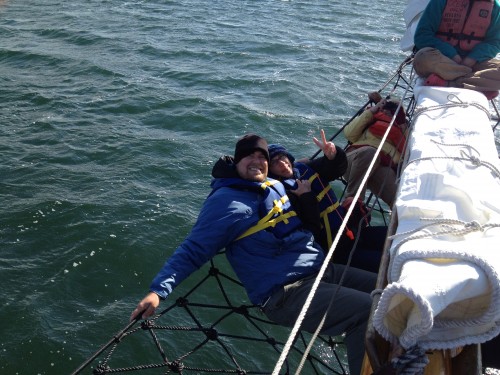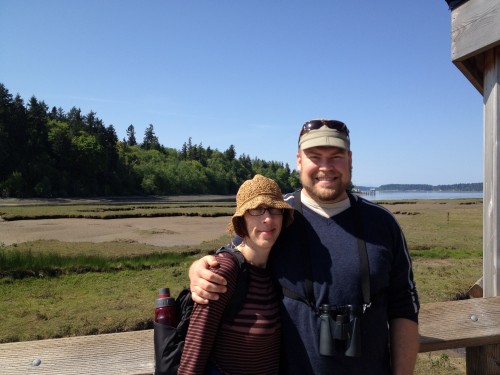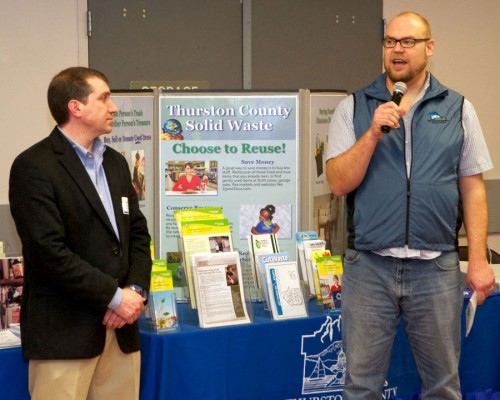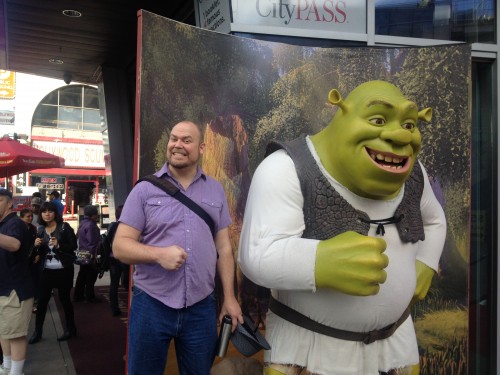Post-Graduate Adventures in Job-Land

Guest post by Brian Stafki
I was part of North Cascades Institute’s Graduate M.Ed. Program third cohort. I felt like I was part of the first, second and fourth cohorts as a groupie, for that matter. I can say things like, “We didn’t even have a learning center to live in — we just camped in the woods,” or, “We were the guinea pigs.” Back then we weren’t positive there would be a Cohort 13. I love introducing myself when I see members of the newest cohort at community events, fairs or conferences. We all share that common bond of having gone through the trials and tribulations of graduate school at Western Washington University with John Miles and crew, and having studied in the craggy North Cascades with North Cascade Institute folks such as Saul Weisberg. And we are all changed forever.
When I finished the program, I felt like I could conquer the world. I had my bright new shiny non-profit that I was “ready” to launch. My keystone program was a high school youth leadership program for high-achieving 10th and 11th graders. It was modeled after the semester-abroad exchange idea. Youth come to a unique destination, learn about sustainability from community experts and prepare to apply what they have learned. Problem was, my New Mexico-based non-profit was pretty far from the place I had come to deeply understand and appreciate, the North Cascades and Puget Sound lowlands. I have never had such a strong sense of place as I have here in the Puget Sound area. That’s also when the reality of funding sources started to kick in: I would not be launching my non-profit right away in my new home of the Puget Sound.
So I did what I could to stay in this region. I worked for the Institute for a while doing everything from being a contract instructor, to a cook, to facilities help. And I did get to live at the Environmental Learning Center after I graduated.
I got back into education for two seasons working for NatureBridge at Olympic Park Institute outside Port Angeles. We had talked about inquiry learning in classes but now I was teaching it at a new level. And it was powerful! But it was still seasonal work.
Before long I was the Education Director for Sound Experience and the historic schooner Adventuress in Port Townsend. One reality that I am not sure any schooling could have prepared me for, though, was a failing economy and the pressures of nonprofits to survive. I found out first-hand that program income was very important for our programs with Sound Experience as other funding sources dried up, including revenue from schools.
 Brian on a day hike with Jennifer at the Nisqually Wildlife Refuge near Olympia. Jennifer calls him a “walking Google” when it comes to nature.
Brian on a day hike with Jennifer at the Nisqually Wildlife Refuge near Olympia. Jennifer calls him a “walking Google” when it comes to nature.
After Sound Experience, I worked with a start-up nonprofit called South Sound Estuary Association in Olympia and entered into a new type of education: education combined with outreach. Part of my work was raising public awareness of the organization, part was raising awareness of issues affecting the South Sound estuary and part was raising support for a new education center. That meant numerous PowerPoints to Rotary Clubs and environmental groups, writing press releases and developing web media. Much of this awareness raising was to build support for the budding organization. This was a new type of education for me.
After my short stint at the South Sound Estuary Association I became the Volunteer Coordinator for WSU Skagit Extension and the Beach Watchers in Mount Vernon. This was my first introduction into working with government bureaucracy. One big lesson I learned was that everything took much longer to get done, especially if it involved money.
I eventually came back to live in Olympia when I got married. I found myself working for the government again, this time for the local Public Works agency. Working for a utility-funded agency was an eye opener. We were scarcer of time than resources. Not worrying as much about the budget has been a real shift in paradigms. As an Education and Outreach Specialist, I often found myself offering informal education to people at our booth at events, through press releases, on social media, on our YouTube channel, presentations and at meetings. We were working to promote waste prevention and resource conservation. It was a real education, too.
 Brian encouraging event participants at the Energy Convergence in Olympia to reduce consumption of goods by reusing products instead.
Brian encouraging event participants at the Energy Convergence in Olympia to reduce consumption of goods by reusing products instead.
While working in the solid waste and recycling industry was aligned with my focus of promoting environmental protection, I also realized that I had other passions that weren’t being filled: I missed the non-profit world. And so, at night and on weekends, I volunteered as the Treasurer and as a board member for Garden Raised Bounty (GRuB). This is where I applied my non-profit education to support a great community organization. We worked to cultivate good food systems, good community and good people. I loved it.
Now, I am starting a new chapter with my wife in the Portland area. I am the new Senior Program Educator for Washington County Solid Waste and Recycling Program in Hillsboro. I am coordinating single-family residence outreach, overseeing purchasing and reviewing content for our educators. I also get to work with the Master Recycler volunteers working in our county. A great part of my job is coordinating with the unique Metro government model and representatives from the Cities of Portland, Beaverton, Gresham, and Clackamas counties. The best part is that I am part of a great team of people that are working to be the area’s waste prevention and recycling resource.
There are many things I took away from graduate school. One lesson that sticks with me the most is from the non-profit management aspect, specifically the need to stay flexible and be ever ready to respond to changing conditions. I still have not given up on my non-profit dream, though now I realize the value in taking incremental steps toward making it a reality in Portland, my new home. Stay tuned.
 Brian on a trip to Hollywood, CA. There is no physical resemblance here, but like an ogre he has many layers.
Brian on a trip to Hollywood, CA. There is no physical resemblance here, but like an ogre he has many layers.
Leading photo: Brian and his wife, Jennifer, hanging out on the bowsprit of 100-year-old schooner Adventuress, operated by Sound Experience. Brian was the Education Director for Sound Experience for three years starting in 2007.
All photos by author.
Brian Stafki graduated from the North Cascades Institute and Western Washington University’s Master of Education program in 2004. He lives in Portland, OR with his wife and two cats. When not working for Washington County he is planning a new garden. He is looking for another non-profit board to join.


Brian, thanks for your reflections on your time with NCI and beyond. Especially beyond. Your journey has been inspiring, and I appreciate the effort you’ve made over all these years to stay in touch, to keep adding to the growing community of all of us who are working to save the world, in so many ways, in so many places. Onward!
Hey, Brian! What a journey. You are an inspiration. Keep up the good work!